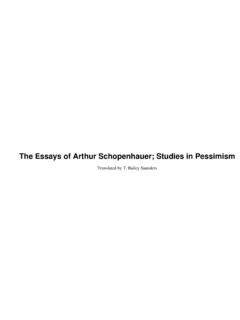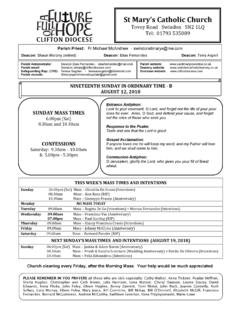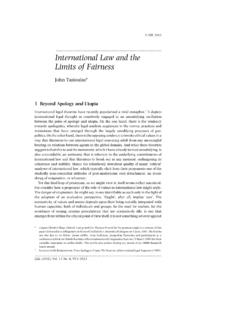Transcription of FUNERAL BLUES W.H. Auden (Stop all the clocks, …
1 1 FUNERAL BLUES Auden (Stop all the clocks, cut off the telephone) 1. Stop all the clocks, cut off the telephone, 2. Prevent the dog from barking with a juicy bone, 3. Silence the pianos and with muffled drum 4. Bring out the coffin, let the mourners come. 5. Let aeroplanes circle moaning overhead 6. Scribbling on the sky the message He Is Dead, 7. Put crepe bows round the white necks of the public doves, 8. Let the traffic policemen wear black cotton gloves. 9. He was my North, my South, my East and West, 10. My working week and my Sunday rest, 11. My noon, my midnight, my talk, my song; 12. I thought that love would last forever: I was wrong. 13. The stars are not wanted now: put out every one; 14. Pack up the moon and dismantle the sun; 15. Pour away the ocean and sweep up the wood; 16. For nothing now can ever come to any good. 2 FUNERAL BLUES Auden (Stop all the clocks, cut off the telephone) 1. Stop all the clocks, cut off the telephone, 2.
2 Prevent the dog from barking with a juicy bone, 3. Silence the pianos and with muffled drum 4. Bring out the coffin, let the mourners come. 5. Let aeroplanes circle moaning overhead 6. Scribbling on the sky the message He Is Dead, 7. Put crepe bows round the white necks of the public doves, 8. Let the traffic policemen wear black cotton gloves. 9. He was my North, my South, my East and West, 10. My working week and my Sunday rest, 11. My noon, my midnight, my talk, my song; 12. I thought that love would last for ever: I was wrong. 13. The stars are not wanted now: put out every one; 14. Pack up the moon and dismantle the sun; 15. Pour away the ocean and sweep up the wood; 16. For nothing now can ever come to any good. 3 FUNERAL BLUES NOTES The poet appears to be suffering the loss of someone close. He calls for a public lament, demanding that nothing may get in the way of his mourning. W. H. Auden 's poem, "Stop all the clocks, cut off the telephone" conveys the meaning of overwhelming grief, tragic loss, and an unrelenting pessimism best exemplified in the last lines, "For nothing now can ever come to any good.
3 " The tone of the poem is that of a melancholy sadness enforced by the internal rhyme scheme (aabb) and the melodic iambic pentameter used. The title and first line of the poem demonstrate the author's inconsolable grief by commanding the audience to do something which is not possible, "Stop all the clocks." This reference to time could also be an allusion to the death and brevity of life which cause the author such agony. The verbs of the first three lines of the first stanza represent how the author wants to eliminate the distractions of the day clocks ticking, telephones ringing, dogs barking, pianos playing in order that everyone may mourn this death. These imperative verbs are all forbidding something and not until the mention of the coffin in line 4 do the verbs begin to be more allowing; "Bring out the coffin, let the mourners come." The next stanza continues to develop the idea of public mourning. The author has been so deeply touched by such a personal loss that he feels the entire world should share in his grief.
4 The subjects of this stanza; the aeroplane, the sky, the white necks of the public doves, and the traffic policemen, are not typically associated with death. However, by incorporating these things into an elaborate FUNERAL procession, the author emphasizes the need for public mourning. Lines 5 and 6 illustrate the importance of the death to the author, for he wants news of it spread across the sky where everyone on earth can see it. Also emphasizing the relationship between the two is the capitalization of the phrase "He Is Dead" from line 6, in which the author tries to deify the deceased. The FUNERAL procession described in lines 7 and 8 serves to further represent both the importance of the deceased and the grief caused by this death. The third stanza, particularly lines 9, 10, and 11, again conveys the intimacy of the relationship between the author and the deceased. The author shows reverence for this man by using exaggerated metaphors to imply his importance to the author.
5 Line 9, "He was my North, my South, my East and West," demonstrates the relationship between the two men and combined with the next line, "My working week and my Sunday rest," implies this relationship to be of a very intimate nature. This is echoed in line 12, "I thought that love would last forever: I was wrong." This can be interpreted to represent the speaker s ignorance toward an inevitable death. The author s love for this man is so all encompassing he describes him as the points of the globe. This love is so strong that the speaker believes it will last forever, not until the death of his companion was the realization made that love, like everything else, will come to an end. 4 The last stanza and in particular line 16 affirms the hopelessness of the poem. The motif of commanding verbs concludes in this stanza where the author serves to convey a purposeless life without the deceased. The readers are instructed to again perform extraordinary tasks in order that the author may mourn.
6 Lines 13 and 14, The stars are not wanted now: Put out every one: Pack up the moon and dismantle the sun; express the despair of the author. A world without the sun and moon would be void of everything, including life. This sentiment is echoed in the following line, Pour away the ocean and sweep up the wood; Both these hyperbolic metaphors are again intended to symbolize the aimless feelings of the author and the void left by the death of this man. By commanding the audience to dispel of the oceans and remove the forests of the world, the speaker shows both how meaningless life is without his lover and how the world would be able to equate with such a loss. The pessimism of the poem is captured best in line 16, For nothing now can ever come to any good. The death of this man has devastated the speaker in such a way that he feels both without purpose and unable to see any good in the world. This line concludes the poem and emphasizes the melancholy tone evident throughout.
7 Like the death of his lover, the last line emphasizes the finality of life and an end void of purpose. A CRITICAL READING OF FUNERAL BLUES W. H. Auden s poem Stop all the clocks poem number IX in his Twelve Songs, and also sometimes known as FUNERAL BLUES is a poem so famous and universally understood that perhaps it is unnecessary to offer much in the way of textual analysis. Yet we re going to offer some notes towards an analysis of FUNERAL BLUES in this post, because if a poem does touch us and move us in some way especially so many of us it s always worth trying to explain why. The poem and the work of W. H. Auden (1907-73) more generally was brought to a whole new audience when it was quoted in full in the 1994 film Four Weddings and a FUNERAL , in which Auden is described as a splendid bugger . You can read Stop all the clocks , which was first published in 1936. A brief summary of FUNERAL BLUES first.
8 The poem is divided into four stanzas. The first two stanzas see the speaker of the poem, who is mourning the loss of a close friend (or, indeed, a lover), making a series of requests or commands. In the first stanza, he asks that the clocks be stopped, the telephone be cut off so it cannot ring, the dog be kept quiet with a bone to gnaw, and the music of the pianos be discontinued. Instead, let the muffled drumbeats historically associated with funerals accompany the coffin as it is brought out and the mourners at the FUNERAL arrive. So far, so straightforward. During a FUNERAL and, more widely, a time of mourning, you might not want to be disturbed by the noise of the world around you, partly because you need time to grieve and partly because such sounds are a reminder that the world around you carries on. The requests the speaker makes are paving the way for the FUNERAL , after all. In the second stanza, the speaker s requests become different, however.
9 He moves from a private or close-knit ceremony of mourning the FUNERAL of FUNERAL BLUES to 5 wish for an altogether more public display of grief. But this is faintly absurd. He asks that the planes circle in the sky and, using the relatively recent phenomenon of skywriting (first used for advertising purposes by the Daily Mail in 1923, just over a decade before Auden wrote FUNERAL BLUES ), that the message He Is Dead be scribbled across the sky. This is, to say the least, unlikely to happen. The crepe bows he wants to put round the necks of the public doves (what are public doves , by the way does he mean pigeons?) suggests that the speaker s grief is overwhelming and that he wants the whole world to mourn with him. The bows round the necks of the doves, and the black cotton gloves black being associated with mourning that he wants the traffic policemen to wear, are both excessive and unreasonable requests to make, but this is precisely the point.
10 One s personal grief dwarfs the concerns of the rest of the world, and it often becomes inconceivable that everyone else would not share in the feeling of loss and sorrow the individual feels. Indeed, as the third stanza makes clear, the man who has died was everything to the speaker: no matter where he was, or what day it was, or what time of day, the dead man was the speaker s life. This suggests that the speaker is talking about more than a friend, and is lamenting the loss of a lover: Auden himself was gay, of course, and the idea that the poem is an elegy by a male poet for a dead male lover is certainly how the poem was interpreted in Four Weddings and a FUNERAL , where John Hannah s character recites the poem at the death of his lover, played by Simon Callow. The speaker thought that his lover would always be around, but with three simple words, heartbreakingly delivered at the end of the stanza, he concludes: I was wrong.








